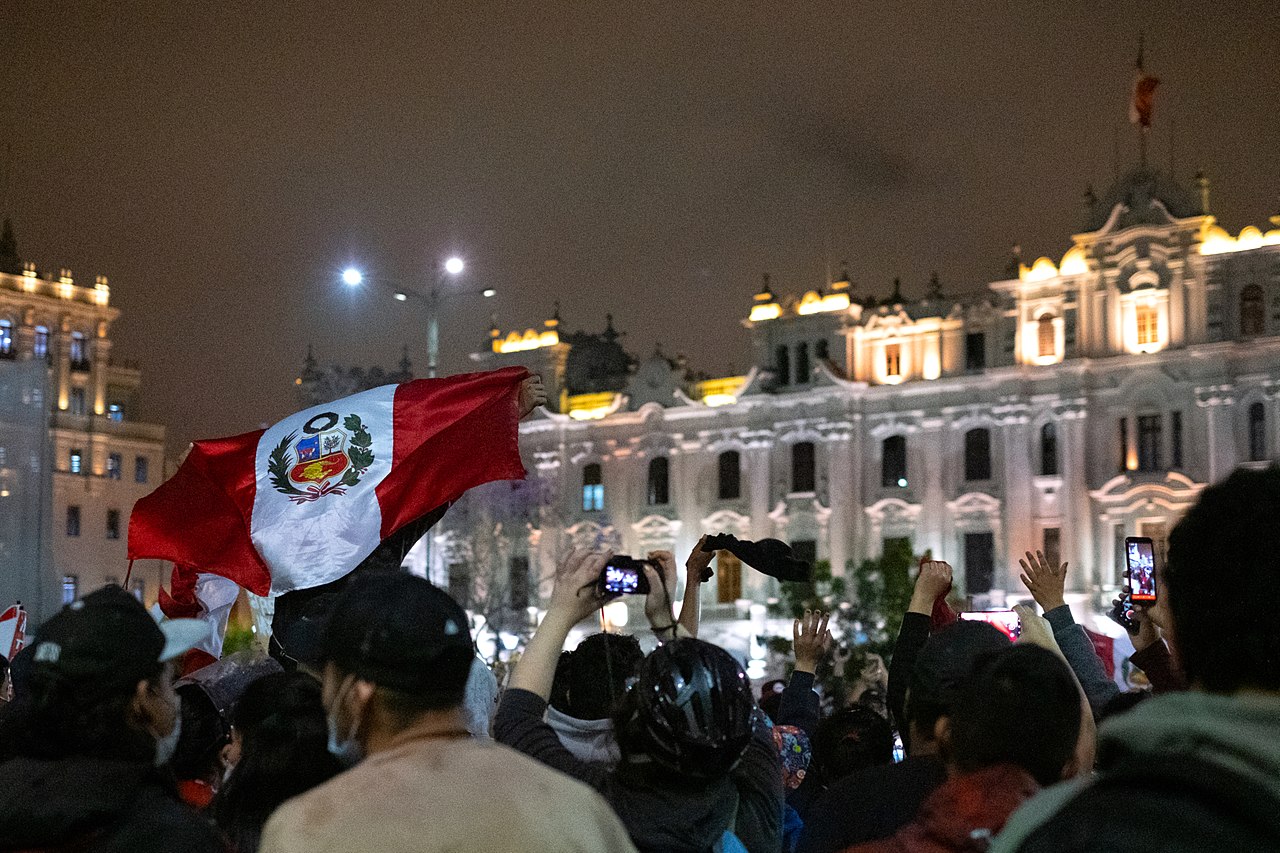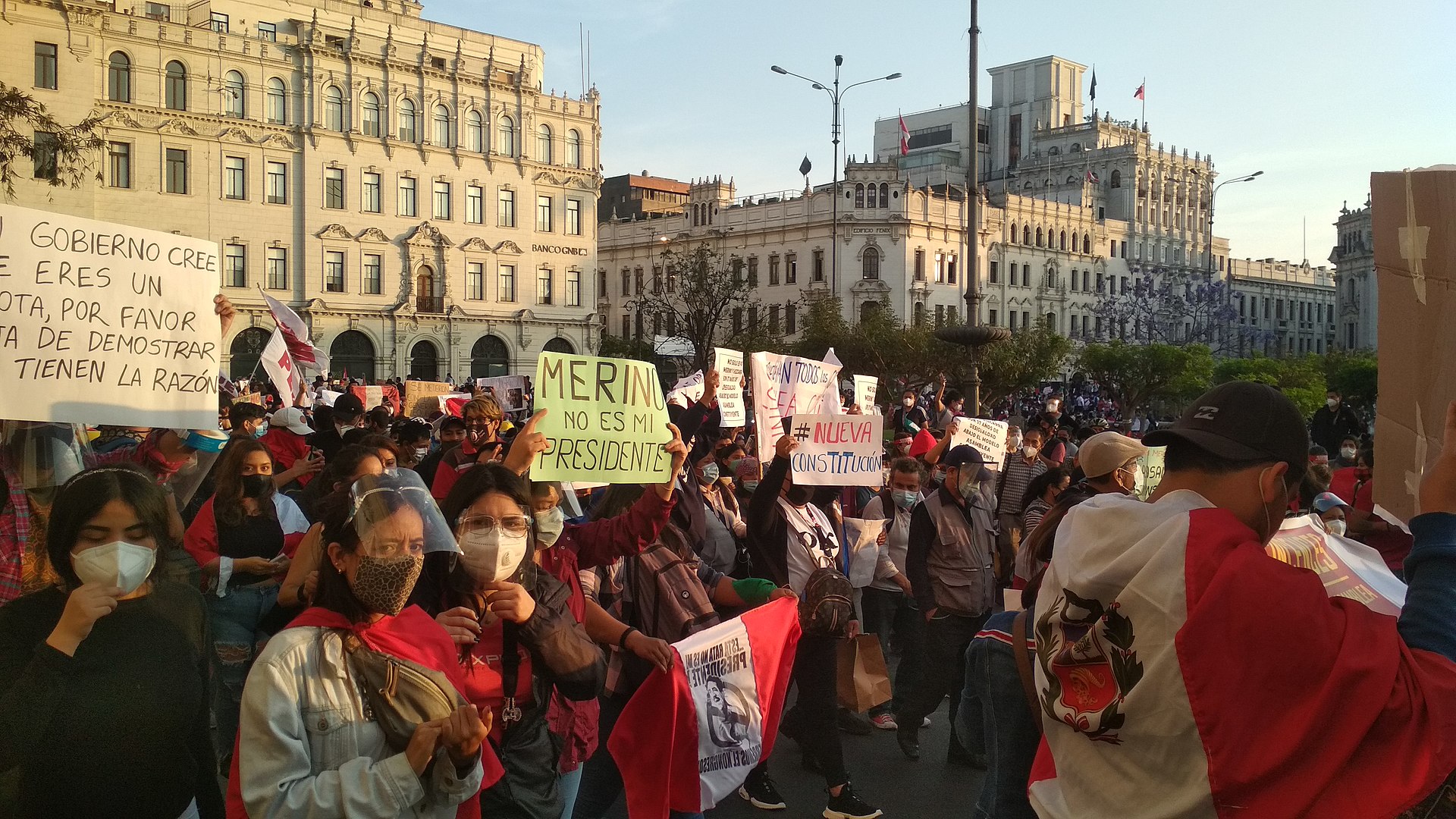
Photo courtesy of flickr.
On Monday, Nov. 9, the Peruvian congress voted to impeach President Martín Vizcarra five months before the next election in April 2021. Protests erupted across the country the following day when the President of Congress Manuel Merino was sworn in. For six days straight, protesters pushed back on what many viewed as an attack on their democracy. Merino resigned that Sunday, Nov. 15 and on Monday, Nov. 16, Peru swore in their third president, Francisco Sagasti, in the span of a week. Sagasti will serve as interim president in a transitional government, will not be able to be a candidate in the April election and will have to stabilize a country in political turmoil in the midst of a pandemic.
Protests
In general, Vizcarra was viewed positively by Peruvians, one Ispos poll found that 78% of Peruvians were against his impeachment. His actions to fight corruption with constitutional amendments and the dissolution of Congress showed he was willing to take decisive action. Vizcarra is a centrist and an independent, with no association to any political party. With no party to back him in Congress, opposition took a foothold and Vizcarra did not work to form any alliances with other parties. Vizcarra’s anti-corruption stance and unwillingness to play the game of politics continued to put him at odds with a Congress that opposed and stalled against him. Vizccarra dissolved Congress in Sept. 2020 and brought in new congressmen, but disagreements between the president and congress continued. The new legislature continued the trend of corruption with 68 of 130 congressmen under investigation for allegations ranging from bribes to murder.
When audio recordings of Vizcarra surfaced in September that showed conversations with his aides where he asked to downplay meetings with singer Richard Cisneros, also known as Richard Swing, allegations of corruption quickly followed. Cisneros had received government contracts, worth 175,400 soles ($49,500), to hold pro-government speeches and his reported close relationship to Vizcarra implied quid pro quo. Vizcarra denied wrongdoing and claimed the recordings were maliciously manipulated. Congressmen demanded Vizcarra resign, but when he refused, they began impeachment proceedings in September on the basis of “moral incapacity.” Only 32 of 87 required congressmen voted in favor. Moral incapacity is a loose term in the Peruvian constitution and can be compared to the 25th amendment of the U.S. constitution that allows for a president’s removal in the event of mental incapability. Despite the failed vote, opposition to Vizcarra in Congress continued until he was impeached on Nov. 9, with 105 votes in favor. The deciding vote was cast by Humberto Acuña, who was found guilty of bribing a police officer in September. Congress has ignored his removal for over two months.
An unpopular Congress removing a popular president incited protests across the country, from the coast to the jungle regions of Peru. Protesters were against Vizcarra’s impeachment, but were not protesting in support of him. The accusations against Vizcarra have not been proven, but instead of beginning an investigative and judicial process, Congress simply removed a president they opposed. The president of the Congress, Manuel Merino, was then sworn in as President of Peru. Many demonstrators viewed the move as a coup from the legislative branch to seize power.

Photo courtesy of Wikimedia Commons.
Protesters, of which a majority were young people, rejected Merino’s government and demanded an end to political corruption. With Peru’s 200th anniversary happening in July, the self-titled “Bicentennial Generation” took it upon themselves to defend their democracy. A key demand from protesters is the end of parliamentary immunity, which grants legislators immunity from any prosecution for their crimes. Parliamentary immunity is common in many countries in one form or another, as it prevents members of government from getting caught up in personal legal battles instead of fulfilling their roles. In the U.S. this is known as sovereign immunity, that protects government entities from lawsuits. Many members of Congress have abused their immunity to extend to crimes of bribery and theft, preventing them from facing prosecution.
Protests calling for Merino’s resignation went on for six days straight. In the streets of Lima, Peru, demonstrators had several clashes with the Peruvian National Police (PNP), where horrific displays of police brutality ensued. Police fired tear gas, ammunition and beat protesters on several occasions. Protesters as young as 14 were forcefully taken into custody and there were several reports of missing persons. The PNP’s actions resulted in the death of two young men, 24-year-old Inti Sotelo Camargo and 22-year-old Jack Bryan Pintado Sánchez.
Despite police pushback, demonstrations continued until Merino’s resignation on Nov. 15. Protesters celebrated their victory and mourned the loss of Camargo and Sánchez. The “bicentennial generation” had succeeded.
Political Background
Tensions between the legislative and executive branches in Peru had been building for a while. In Dec. 2018, a referendum was held to decide if amendments Vizcarra had proposed should be added to the Peruvian constitution. These amendments would create a new “National Justice Board” to appoint and confirm judges, prevent congressmen from seeking immediate reelection and require the supervision of campaign finances. The National Justice Board would replace the National Magistrates Council, which was plagued by corruption.
Vizcarra had originally proposed four amendments, one would have reestablished the Peruvian Senate that was dissolved in 1992. However, the opposition party, Popular Force, changed the amendment to allow congressmen to run for Senate after serving in Congress and then be able to run again for Congress after serving in the Senate, creating a revolving door effect in the legislature. Vizcarra opposed the changes and pleaded with the public to vote no on the amendment. From there, three out of the four amendments passed and Vizcarra’s popularity rose. His clear stance against corruption was a relief to Peruvians who, for most of their lives, had seen presidents and congressmen steal from the country they served. However, Popular Force made it difficult for Vizcarra to pass his anti-corruption reforms, while at the same time the party rushed the confirmation—with no background checks—of judges to the Constitutional Court of Peru. Vizcarra asked for a vote of confidence from the opposition-led Congress twice and after two votes of no-confidence, the constitution allowed the president to dissolve Congress.
Vizcarra dissolved the opposition-led Congress on Sept. 30, 2019. Congress refused to acknowledge the move, suspended Vizcarra as president and named Vizcarra’s Vice President, Mercedes Aráoz, as the interim president. Congress’s actions were then declared void by multiple government officials, as the legislature was already closed and military leaders ensured Vizcarra that they still recognized him as the president. Aráoz resigned from her position the following day, calling for unity among Peruvians.
With a dissolved Congress, Vizcarra announced special elections to be held in Jan. 2020. With over 20 political parties vying for seats in Congress, the elections removed Popular Force’s foothold, but political corruption continued. New parties recognized the fragmentation in Congress and formed alliances to maintain power against their main threat, Vizcarra. The unity among Vizcarra’s opposition eventually led to his impeachment over “moral incapacity.”
One Week, Three Presidents
After Merino’s resignation, Francisco Sagasti was appointed as interim president by Congress and sworn in on Nov. 16. Sagasti was a legislator from the Purple Party and is ideologically a centrist. Four presidents within the term of one, Sagasti will have to steady a country caught up in an economic downturn and struggling to deal with COVID-19. Sagasti stepping in has calmed protests, but there is still a distrust towards politicians that he will have to mend.
Before Vizcarra, five of the last six presidents have been sentenced to jail. The “bicentennial generation” took to the streets to combat the corruption they had seen their entire lives. While Merino’s resignation may be a victory for the people, many recognize there is still a long way to go to achieve a political system that will work to their benefit. With elections coming in April, young Peruvians are ready to demand accountability among their politicians, a step closer to the republic Peru’s founders envisioned nearly 200 years ago.
